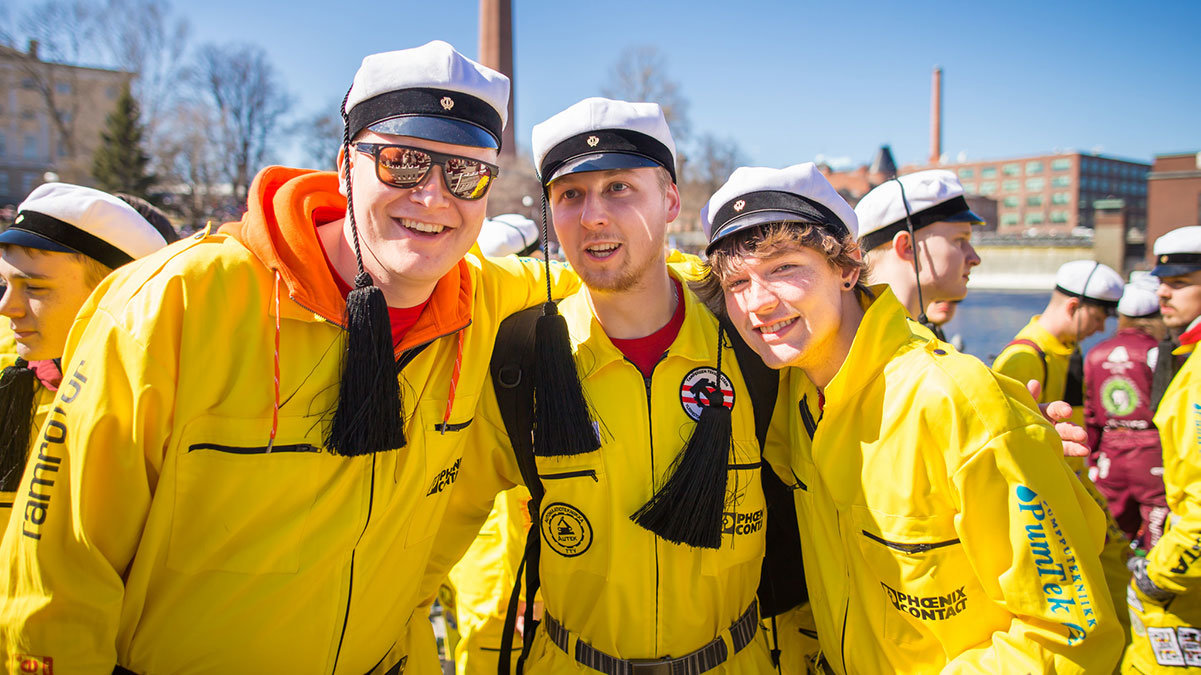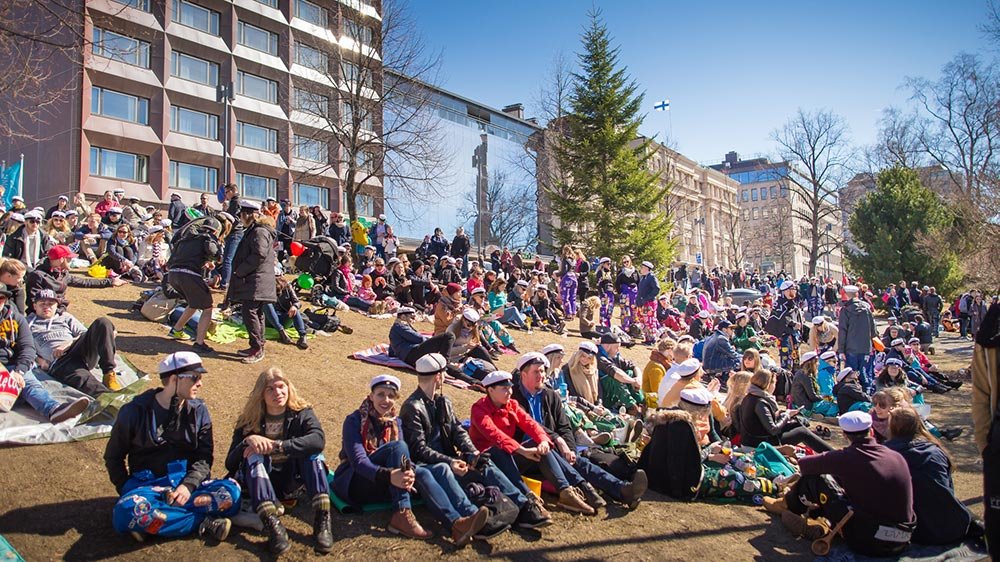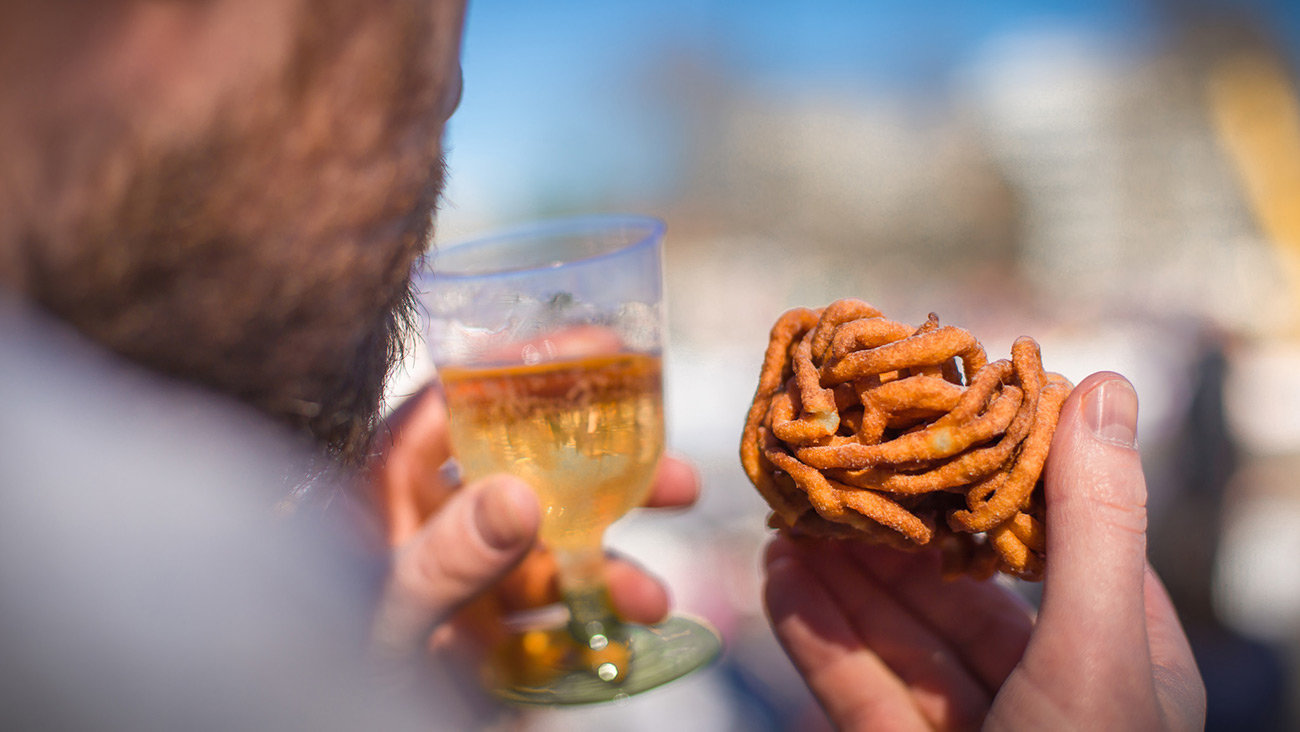When a foreigner moves to Finland many things will catch their attention in the first few weeks or months. From Finnish general attitude, quirks, social rules to shops opening hours or the way to do everyday things that may differ a little or a lot from one’s home country. But one thing they will also soon start to understand is which are the biggest and most cherished celebrations in this country.
This means a foreigner that has moved here for long enough, even if it has only been a couple of months, at some point will have heard about Vappu. They will start to realize as well how important and how big this holiday is to Finns.
 Even though it has only been officially recognized as a public holiday since 1979, Vappu is a centuries old tradition that happens annually on the 1st of May and has its roots in pagan origins -much like many other festivities not only in Finland but in Nordic countries in general.
Even though it has only been officially recognized as a public holiday since 1979, Vappu is a centuries old tradition that happens annually on the 1st of May and has its roots in pagan origins -much like many other festivities not only in Finland but in Nordic countries in general.
This celebration was named after the English catholic saint Walburg or Walpurga (Valburg in Finnish). She was made a saint on the 1st of May in the 9th century (870 AD) for fighting, amongst other things, against witchcraft. Because of that, the night between April 30th and May 1st started to be named 'Walpurgis Night' which the Finns shortened to Vappu.
And what started out as a tribute to a saint, the celebration of the end of winter and the welcoming of good weather, has since become more than that.
It is still very much a glorification and even climax of spring season, but over the years it has become a celebration for workers and students as well. Like in most countries around the world, workers rights are celebrated here and have been since the early 1900’s.
Often times there are demonstrations on Vappu week, eve or day for better working conditions, against specific laws or just as a commemoration of hard-fought rights already conquered and it is something that is never forgotten in this occasion.
A day for students
But as the years progressed, it has become, more and more, a day for students as it signifies the end of the school year. A tradition that started in the late 1870’s in the Helsinki area and was most likely inspired by Swedish customs.
For students in general, but college students in particular, it is the most anticipated time of the year, as they start to celebrate it a couple of weeks (or more) before the actual Vappu day (Vappupäivä).

For students Vappu also symbolizes the end of the school year. Photo by Laura Vanzo - Visit Tampere.
From different types of events happening in their universities to raffle sales of products they made to get money for the main day -which has a parade filled with balloons, confetti, serpentine throws and party-poppers and ends with a picnic at a public park-, it is a very exciting time to be a student in Finland.
During these days one can see students everywhere donning their colorful overalls (Haalarit, in Finnish) with each color being related to their specific studies field and college, with many patches and ornaments with different meanings sown onto them. The more patches and trinkets worn, the further the student is in their studies.
The day of the white hats
The other very important detail to be noticed is the white hats, or Ylioppilaslakki, which was also borrowed from Swedish academic traditions and it is a symbol of education. It is awarded at the end of high school graduation and even though it is always white with a black flap, it has details that may vary depending on the college, studies or city which the student is from.

The white hats, or Ylioppilaslakki, is a symbol of education. Photo by Laura Vanzo - Visit Tampere.
It is a badge of honor and used not only by students but also by everyone who has graduated high school and/or college on this day. It is something that is seen on people not only on Vappu’s eve (Vappuaatto) and day but mostly on students throughout summer as well.
Its significance is such that on Vappu’s eve at 6 pm students will go to Helsinki market square and put on a big student cap on the nude female statue of Havis Amanda, or Manta as Finnish students affectionately call her, after washing her: a symbol of Helsinki that was sculpted by Ville Vallgren in 1908 and is called “The Daughter of the Baltic Sea”.
This one is the most emblematic but it is done to other several statues in Helsinki and also in all Finnish cities. Vappu is also a huge celebration that that fills the streets of other major cities, such as Tampere and Turku.

Gathering a public park for a picnic is another tradition in Vappu. Photo by Laura Vanzo - Visit Tampere.
Food and beverages
As any other good festivity, Vappu tradition would not be complete without its specific food and beverages. So starting on April 30th but with the biggest emphasis on May 1st custom dictates that, no matter the type of weather, people will gather in a public park -the bigger, the better- for a picnic to enjoy the celebrations, which in Helsinki usually means going to Kaivopuisto or Ullanlinna.
For said picnic Finns mostly consume sima, a fruity drink that has been popular in Finland since the 18th century, and that can be alcoholic or not; sparkling wine, called skumppa in Finnish; different flavored doughnuts or munkki; and funnel cakes known as tippaleipä.

Tippaleipä is one of the delicacies that Finns love eating in Vappu. Photo by Laura Vanzo - Visit Tampere.
Considering the weather is not always sunny and warm, it is always better to have a warm jacket or sweater and an umbrella nearby.
This year the weather forecast is a minimum of 3 degrees, maximum of 9 and cloudy on Vappu’s Eve and a minimum of 6 degrees and maximum of 14 with partly cloudy skies on Vappu day, in Helsinki.
Whatever the weather, it is guaranteed that Finns, and many foreigners, will be celebrating this holiday at the nearest park with their sima, sparkling wine and sweet treats.












